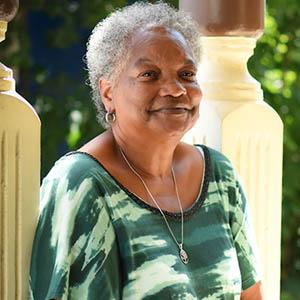Shelley’s

At the Process, I learned how to become more responsible for myself and my sobriety. That didn’t happen anywhere else. The Process didn’t give me the close coddling that I got at other programs. The Process gave me opportunities. It’s up to you to take advantage. Part of recovery is taking care of the business you have in day to day life. Let’s face it, when you’re an addict, you’re not thinking about buying food. You’re thinking about the next drink. I’ll be honest, when I was drinking – even though I had medical coverage – I didn’t make doctor’s appointments. That was on the back burner. I wasn’t even thinking about that. My head was in a whole different space. The Process got me back on “life track”. Today, I am able to manage my sobriety. No one else is going to do it for me.
Group counseling at the Process is on a different level. The groups are geared toward living in sobriety. One of the biggest things that helped me stay motivated and engaged in my recovery on a daily basis was keeping a planner. I know what I plan to do tomorrow. It keeps me focused. I’ll go back to that planner a million times. I leave the house at quarter of six every day because I go to the Early Bird meeting. It’s my medicine in the morning. Some people roll out of bed and pray and meditate; I have a hard time with those things. I go to my meeting… seven days a week. My day isn’t right if I don’t go. If you are someone who is wavering between SMART Recovery or the 12 Steps, nobody is forcing you into either one of those modes. The staff lets you choose:
In this phase of sobriety, you’re the one governing your recovery. The Process brought that to me. Even the groups that talked about relapsing were helpful. In my mind, I thought: “I don’t want to hear about relapsing,” but it was important to hear about the signs of relapse and what to do. I feel strongly that they gave me tools to use if I find myself in that predicament. But the biggest tool was learning how NOT to get yourself in that predicament.
The staff at the sober houses are so important. It’s more than group therapy – it’s dealing with life skills. One cannot work without the other. What happens in group goes home to the sober house. Whether it’s re-learning social skills – how to treat other people or how to treat yourself – you’ve got to go live it. It’s practiced in the house. One is reinforced by the other.
Prior to becoming sober, I knew I didn’t want to work anymore at age sixty-two. But I also had to learn how to live…period. Now that there is no job, I have to stay sober and I have to be vigilant about my recovery. But how do I fill my other time? I thought: “What am I going to do? Go to meetings all day and all night?” No, that’s not living. How do I live in sobriety? For me, it’s keeping myself involved with constructive, meaningful activities. Not unlike work, you get a lot out of it and you identify who you are with what you do. For me, the first thing I did was look around for volunteer jobs. I know that I’m going to get up and not only go to a meeting, but I’m also going to go volunteer so I’m interacting with other people. I volunteer at the food bank two days a week. I also joined the Senior Citizens Club. They have a beautiful center. I love it. Another thing I did was become a member of the library. I like to read. That also gets you out of the house and it gives you something to do. The library has all kinds of things other than books and computers; they have free plays and concerts. Again, I can plan my day – it’s real life stuff. At the Senior Citizens Club, I do line dancing. I just love it. My first week there, I dabbled in everything and then I figured out what I liked. They have movie nights and bingo. I also got myself a senior bus pass. I haven’t had a driver’s license in ten years so I took driving lessons. There are girls in the house who have cars and let me drive. I’ve been practicing.
This is life. I’m figuring out how to manage it. I was just speaking at a meeting and I said: “I don’t know when the change happened to me, it just happened”. Things that I used to be mad about, I don’t get mad about anymore. I just say: “It’s in God’s hands. Let’s see what happens”.